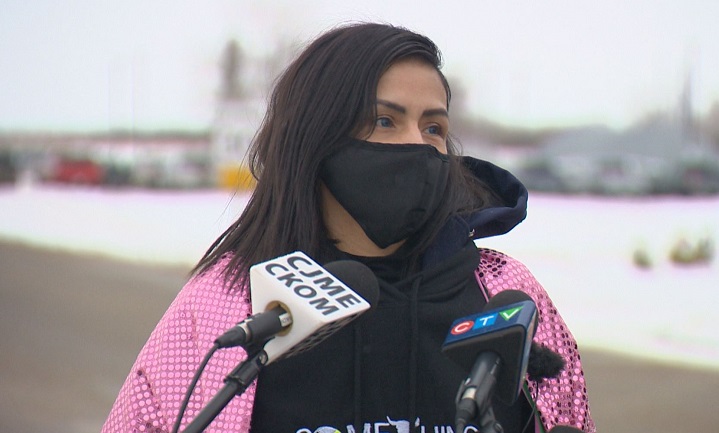Julie Paul’s 26-year-old son, River Peters, is one of many inmates at the Regina Correctional Centre who have tested positive for COVID-19 and she is demanding better health care for those infected.

After hearing the news about her son, Paul, along with several concerned mothers, organized a rally outside the facility on Tuesday to express their displeasure with the Saskatchewan government.
“It was very painful. I didn’t hear from him for a whole week before he even told me. He wasn’t able to call me and tell me this,” Paul said.
“I was calling the jail and they said if he had COVID I would have been notified, but I wasn’t.”
Paul’s son is one of 62 active cases among inmates, confirmed by the Saskatchewan government on Monday evening. There are also 12 active cases among staff.
Paul claims patients inside the correctional centre aren’t being given the care they deserve, such as access to their food canteen, hot drinking water, better health care and access to a telephone to communicate with loved ones.
“They are very scared for their lives because they are being left there without any help. For the people that have COVID, no one is going to check on them,” Paul said.
Despite Paul’s claims, the province told Global News in an email Monday evening that the health and safety of both inmates and staff is something that continues to be of high importance.
“We continue to work with facility staff and public health authorities to ensure offenders receive appropriate care,” the province said in the email.

Get daily National news
“Inmates have access to health services and mental health services, as they did before the pandemic. Corrections is able to facilitate medical and psychiatric services virtually when required.”

Saskatchewan’s Corrections Minister Christine Tell wasn’t at the rally on Tuesday, leaving some to question her commitment to the job, including Saskatchewan NDP member Nicole Sarauer.
“This is a minister who was in California in November and isn’t here today to listen to these moms. She isn’t inside listening to the inmates or the staff and has been largely absent during this entire outbreak,” Sarauer said.
Paul also spoke about inmates on remand and was in favour of releasing those with COVID-19, depending on the situation.
“They need to get out of there. It’s just inhumane to keep them in there when it’s just getting infiltrated with more and more cases,” Paul said.
“It would be totally different if they were getting the proper care, but they’re not.”
However, the province said it isn’t in the position to make those types of decisions.
“Corrections does not have the legal authority to release remanded inmates. The courts arrive at decisions around remand following assessments by defense counsel and prosecutors, and after all appropriate proceedings,” the province said.
“The Public Prosecutions Branch in the Ministry of Justice and Attorney General has directed prosecutors to consider the current level of COVID-19 infections with an emphasis on public safety when assessing cases.”
The province said it’s implemented a number of measures to battle the recent outbreak including cancelling in-person visits, quarantining new admissions for 14 days along with enhanced cleaning and stronger phone privileges.
“In light of COVID-19, Corrections is also providing offenders with an additional 10-minute free call to ensure they can stay in contact with family and friends,” the province said.
“Inmates are also able to contact chaplains and Elders by phone in lieu of face-to-face meetings. These phone calls are free, and are considered privileged phone calls.”
The province also said it’s looking into voluntary testing for inmates, something made available to staff last week.
Despite these measures, Paul is having a hard time believing that people care for these inmates.
“I just think they want them to die in there. I think they want to get rid of them,” Paul said. “When you’re in jail, nobody cares — it’s just horrible. I want people to care.”
Across 11 provincial correctional centres, including four youth centres, there are 78 active COVID-19 cases among inmates and 15 among staff as of Monday evening.











Comments